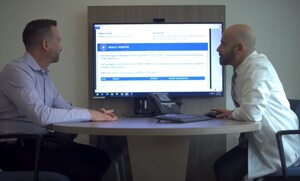HACKENSACK, N.J., June 4, 2020 /PRNewswire/ -- Clinicians from Hackensack Meridian Health, the state's largest and most comprehensive health network, have published a list of papers in major journals based on experiences from the first wave of the COVID-19 pandemic.
The publications include best-practice recommendations in the "new normal" of preventing new infections, perspectives on how some aspects of medicine are apt to change and also some case histories from patients infected with the SARS-CoV2 virus.
"As one of the epicenters of the COVID-19 pandemic, our clinicians have treated over 10,000 patients and have saved many lives. Along their journey in this pandemic, they are participating in many research trials that show promise in fighting this virus," said Robert C. Garrett, FACHE, chief executive officer of Hackensack Meridian Health. "Now they are helping to advance the medical literature through their experiences and expertise."
"This is a quickly growing literature, and we're gratified to be doing our part," said Ihor Sawczuk, M.D., FACS, president of Hackensack Meridian Health's Northern Market, and the chief research officer of the network. "Our clinicians, research scientists, nurses, and academics are all contributing their own vital pieces to this enormous puzzle."
Some of the most promising Hackensack Meridian Health publications from the first wave of this ongoing pandemic:
- medRxiv. Using the Hackensack Meridian Health large observational database of more than 3,000 hospitalized COVID-19 patients called RE-COV-RY (Real world Evidence COVid-19 RegistrY), a team of network experts found the touted malaria treatment, hydroxychloroquine, does not improve survival for hospitalized patients. But the immunotherapy tocilizumab instead appears to improve survival among critically ill intensive care unit (ICU) patients. The team was led by Stuart Goldberg, M.D., and Andrew Ip, M.D., both of the Division of Outcomes Research at John Theurer Cancer Center at Hackensack University Medical Center. This study appeared online on May 27.
- medRxiv. Contrary to some theories that controlling hypertension via the renin-angiotensin-aldosterone system (RAAS) may be harmful by exacerbating the cytokine storm which has proven so harmful in COVID-19 patients, the same RE-COV-RY database found evidence that controlling hypertension this way is not only not harmful, but "protective." The retrospective, multicenter, convenience sampling study of hospitalized COVID-19 patients performed across the health network among its 3,000-patient COVID-19 cohort, was led again by Goldberg and Ip. The study appeared online on April 29.
- The Journal of Urology. Medical students looking for a match in urology have been "inundating" programs with applications – and those numbers should be limited in the era of COVID-19, according to Hossein Sedaghi-Nejad, M.D., FACS, the director of the Center for Male Reproductive Medicine at Hackensack University Medical Center. The perspective was co-written with two colleagues and appeared in late May.
- Cureus. Three Hackensack Meridian Health authors report the case history of a 41-year-old female who underwent a series of interventions including the latest investigational treatments, prone positioning, and a mechanical ventilator, before clinicians tried venovenous extracorporeal membrane oxygenation (VV-ECMO), an oxygenating blood pump which is used for lung transplant patients. The study appeared April 17.
- Catheterizations and Cardiovascular Interventions. A web-based survey indicates that reduced procedures at cardiac catherization laboratories is impacting fellowship training for interventional cardiology, according to a team of authors including Pranaychan J. Vaidya, M.D., a cardiologist at Hackensack University Medical Center. The findings were published online in mid-May.
- Annals of Surgery. A paper authored by 34 surgeons posed the question "COVID-19, Ethics and Equity – What is Our Role as Surgeons?" on May 1. Among the authors was Elizabeth Kiselak, a trauma surgeon at Hackensack University Medical Center. Together, the authors argue there is a shift from "individual patient-centered care to a more public health, population-centered care approach" – and surgeons must help the most patients they can. The group also assumes several positions on some societal impacts of the pandemic, stating, "We find ourselves asking what kind of society we want for ourselves, our families, and to leave to our children in the future."
- Medicine. "Novel Coronavirus 2019 (COVID-19): A case report and review of Treatments," was authored by two Hackensack Meridian Health physicians: Steven Douedi, M.D., of the Jersey Shore University Medical Center, and Jeffrey Miskoff, D.O., of Jersey Shore University Medical Center and also the Hackensack Meridian School of Medicine at Seton Hall University. The paper was published online in May.
- Neuromodulation: Technology at the Neural Interface. The use of non-invasive vagus nerve stimulation – a treatment used for epilepsy and depression – was evaluated in two COVID-19 patients, one in New York and one in Baltimore. The stimulation "rapidly provided clinical relevant benefits" in the breathing of the two patients, according to the five authors, a group including Georgios Giannakopoulos, D.O., an infectious disease specialist at Bayshore Medical Center.
- American Journal of Otolaryngology. "COVID-19 and Rhinology: A Look at the Future" is a paper written by three specialists who said that there are unique risk factors for specialists of the nose, where the SARS-CoV2 virus propagates. Co-written by P.F. Svider, M.D., a doctor at Hackensack University Medical Center and Bergen Medical Associates in Emerson, the study contends that telemedicine, quicker viral testing, and the use of computerized tomography (CT) scans in place of some nasal endoscopy could cut back on viral transmission. The same three authors also wrote an accompanying paper in the same April 15 issue emphasizing the "need to embrace telemedicine due to COVID-19."
- Advances in Radiation Oncology. Miriam A. Knoll, M.D., a radiation oncologist at John Theurer Cancer Center and medical director of the Department of Radiation Oncology at Hackensack Meridian Mountainside Medical Center, is the corresponding author on "The Impact of COVID-19 on Radiation Oncology Clinics and Patients with Cancer in the United States," published at the end of March. The paper contends that cancer treatments must proceed, even through interruptions due to viral outbreaks, using intelligent screening and teamwork.
Other papers, including those from the network's nursing personnel and the Hackensack Meridian Center for Discovery and Innovation, are also at various stages of proofing, acceptance, and submission.
ABOUT HACKENSACK MERIDIAN HEALTH
Hackensack Meridian Health is a leading not-for-profit health care organization that is the largest, most comprehensive and truly integrated health care network in New Jersey, offering a complete range of medical services, innovative research and life-enhancing care.
Hackensack Meridian Health comprises 17 hospitals from Bergen to Ocean counties, which includes three academic medical centers – Hackensack University Medical Center in Hackensack, Jersey Shore University Medical Center in Neptune, JFK Medical Center in Edison; two children's hospitals - Joseph M. Sanzari Children's Hospital in Hackensack, K. Hovnanian Children's Hospital in Neptune; nine community hospitals – Bayshore Medical Center in Holmdel, Mountainside Medical Center in Montclair, Ocean Medical Center in Brick, Palisades Medical Center in North Bergen, Pascack Valley Medical Center in Westwood, Raritan Bay Medical Center in Old Bridge, Raritan Bay Medical Center in Perth Amboy, Riverview Medical Center in Red Bank, and Southern Ocean Medical Center in Manahawkin; a behavioral health hospital – Carrier Clinic in Belle Mead; and two rehabilitation hospitals - JFK Johnson Rehabilitation Institute in Edison and Shore Rehabilitation Institute in Brick.
Additionally, the network has more than 500 patient care locations throughout the state which include ambulatory care centers, surgery centers, home health services, long-term care and assisted living communities, ambulance services, lifesaving air medical transportation, fitness and wellness centers, rehabilitation centers, urgent care centers and physician practice locations. Hackensack Meridian Health has more than 34,100 team members, and 6,500 physicians and is a distinguished leader in health care philanthropy, committed to the health and well-being of the communities it serves.
The network's notable distinctions include having four hospitals among the top 10 in New Jersey by U.S. News and World Report. Other honors include consistently achieving Magnet® recognition for nursing excellence from the American Nurses Credentialing Center and being named to Becker's Healthcare's "150 Top Places to Work in Healthcare/2019" list.
The Hackensack Meridian School of Medicine at Seton Hall University, the first private medical school in New Jersey in more than 50 years, welcomed its first class of students in 2018 to its On3 campus in Nutley and Clifton. Additionally, the network partnered with Memorial Sloan Kettering Cancer Center to find more cures for cancer faster while ensuring that patients have access to the highest quality, most individualized cancer care when and where they need it.
Hackensack Meridian Health is a member of AllSpire Health Partners, an interstate consortium of leading health systems, to focus on the sharing of best practices in clinical care and achieving efficiencies.
For additional information, please visit www.HackensackMeridianHealth.org.
SOURCE Hackensack Meridian Health

WANT YOUR COMPANY'S NEWS FEATURED ON PRNEWSWIRE.COM?
Newsrooms &
Influencers
Digital Media
Outlets
Journalists
Opted In





Share this article